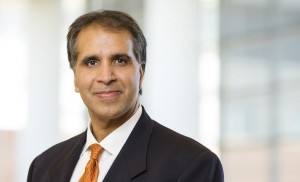
(Image via Getty)
As a law school administrator, I spend time these days looking at how public law schools and universities around the country are grappling with the challenges that arise when contentious speakers are invited (often by so-called Registered Student Organizations or RSOs) to campuses for events that trigger passion on all sides of controversial issues, and that require university officials to consider unusual security measures and costs to deal with possible violence. To cite but one example, the University of California at Berkeley reportedly spent close to $1 million in late 2017 to prepare for a free speech event.
Such examples naturally raise the quite reasonable question of when the price for providing security for a controversial speaker event justifies cancelling the event. Or placing limits on the number and type of attendees (say, restricting the event to students who possess valid student IDs). Or imposing on the inviting student group some or all of the security costs or the costs of procuring insurance policies to spread financial risks.

Meet Me At ILTACON: Opus 2 And AI Workbench
Swing by Booth 800 for a look at the latest in AI-powered case management.
Supreme Court and lower court case law is extremely underdeveloped here — but decisions lean decidedly against any meaningful attendee limits or cost-sharing imposed on event organizers. One Supreme Court case (Forsyth County) that lower courts look to was decided in 1992, and struck down an attempt by a Georgia county to calibrate the fees it charged (up to $1,000) to people who sought a (required) permit to hold large parades or rallies on public streets according to the costs the county would incur in ensuring safety and good order during the particular event.
Two big concerns animate the Supreme Court’s (and lower courts’) skepticism here. First, judges worry that bureaucrats or enforcement officials will, if given too much discretion, distort public debate (including on public policy issues) by selectively imposing regulations or costs on some disfavored speakers while sparing favored subjects or viewpoints these burdens.
Second, courts do not want to empower opponents of a speaker by allowing their threats of trouble-making to constrain or silence the speaker altogether. In our democracy, more speech is to be favored over less speech (especially as to controversial matters of public policy), and the proper answer to unwise or hurtful speech is better, counter speech, not silencing (or allowing someone else to silence) the original speaker.
As against these concerns of government distortion and conferral of a heckler’s veto, of course, the important government objectives of fiscal integrity and the avoidance of violence must be weighed.

Decrypting Crypto, Digital Assets, And Web3
"Decrypting Crypto" is a go-to guide for understanding the technology and tools underlying Web3 and issues raised in the context of specific legal practice areas.
The courts’ sentiments against government regulation here are quite understandable and indeed laudable, but to my mind they should not apply to modern university settings.
For starters, Forsyth County was 5-4, and no member of its majority is still on the Court. Fees up to $1,000 seem quaint in a world where universities are now thinking in terms of seven figures plus to deal with these kinds of episodes. The reality is that, given the current political climate and technology, the risks of major conflict are higher. The advent of the internet has also generated two big effects, both of which argue for more flexibility for regulators. First, social media has enabled trouble makers to credibly threaten more violence, involving more people, with more immediacy. And second, if an event has to be reduced in size or cancelled, the internet provides an outlet for a controversial speaker to nonetheless get the speech out.
If the rejoinder to some of these suggestions is that the government simply needs to spend more money up front to ensure safety (and rein in the persons likely to initiate the violence), we must remember that universities don’t have robust revenue-generating devices the way cities and counties do, and our primary mission, of course, involves classrooms and laboratories more than it does massive rallies and demonstrations (even if the latter be a significant extracurricular component of the educational experience).
To be sure, universities — no less than municipalities — should have data-informed, before-the-fact, policies that minimize discretion and thus the likelihood that the speaker’s message or viewpoint, rather than neutral legitimate concerns about violence and property damage, account for limits, cancellations, or cost-sharing.
But even if we minimize intentional distortion that comes from too much discretion by enforcement officials, there remains the courts’ concerns about the dangers of giving hecklers a veto and the speech that is lost on that account. And not just any, garden-variety, speech, but speech on controversial issues, which is precisely the kind of speech most important to a well-functioning democracy. As the Court observed in the famous New York Times v. Sullivan case, “debate on public issues [needs to] be uninhibited, robust, and wide-open, and . . . it may well [have to] include vehement, caustic, and sometimes unpleasantly sharp attacks.”
The concern about the heckler’s veto is real, and important (even in an age when, as noted above, the internet allows people to avoid any veto of person-to-person speech by going through cyberspace). But so too are universities’ concerns about safety and cost. And if courts don’t allow universities to manage these competing objectives with good-faith policies that try to minimize discretion and maximize viewpoint neutrality, then universities might (and can) simply stop facilitating student RSO-invited speech on the decentralized terms that currently prevail. Unlike those who regulate streets and parks, universities can withdraw the RSO fora if costs become prohibitive. And that too will result in a (potentially more problematic) loss of speech.
Giving students leeway to hold events and invite speakers is good training for them to become truly adult and mature citizens. Universities have a proud tradition of encouraging and facilitating edgy speech on all topics and reflecting most all viewpoints. But universities have to maintain safety, and also fiscal integrity. And when push comes to shove, the teaching and research missions of the university will have to be given priority over facilitation of student events if financial cost and security cannot be managed. Universities will have no choice but to withdraw the broad platform for speech they currently provide.
The result will be much more centralization of the authority to invite outside speakers. Outside speakers will still be invited, but student groups will no longer have as much discretion and power to bring them to campus; instead, academics and administrators will make more of those inviting decisions. Perhaps some additional centralization is a good idea in any event, to ensure that invited speakers are not just provocateurs but instead are seriously engaged in the process of presenting and discussing ideas and data — the core mission of the university. But centralization of invitation authority will likely breed more, not less, viewpoint skew; the fewer people making the invitations, the more likely the invitations will reflect the content and viewpoint preferences of a small and less representative group within the university.
At the end of the day, legitimate qualms about a heckler’s veto must therefore be balanced against equally legitimate — and quite weighty — concerns about how universities will respond if forced to run high safety and financial risks. Sensible judicial doctrine needs to take account of the fact that universities have significant choice about whether to pull back the broad podium they currently maintain.
 Vikram Amar is the Dean of the University of Illinois College of Law, where he also serves the Iwan Foundation Professor of Law. His primary fields of teaching and study are constitutional law, federal courts, and civil and criminal procedure. A fuller bio and CV can be found at https://www.law.illinois.edu/faculty/profile/VikramAmar, and he can be reached at [email protected].
Vikram Amar is the Dean of the University of Illinois College of Law, where he also serves the Iwan Foundation Professor of Law. His primary fields of teaching and study are constitutional law, federal courts, and civil and criminal procedure. A fuller bio and CV can be found at https://www.law.illinois.edu/faculty/profile/VikramAmar, and he can be reached at [email protected].